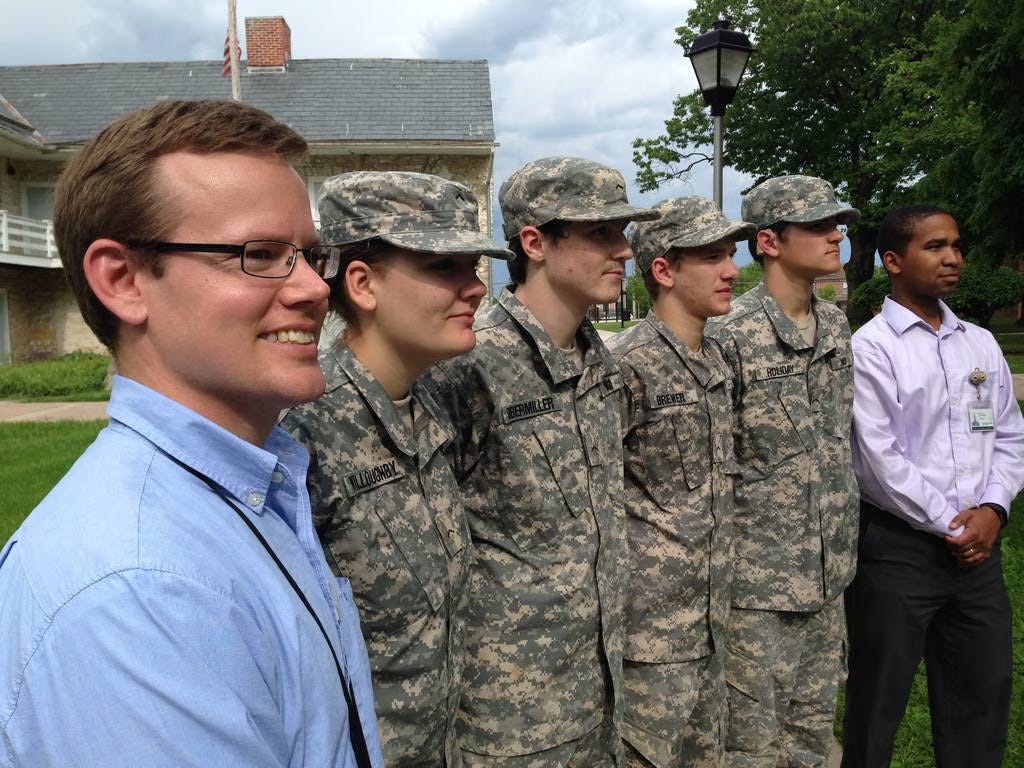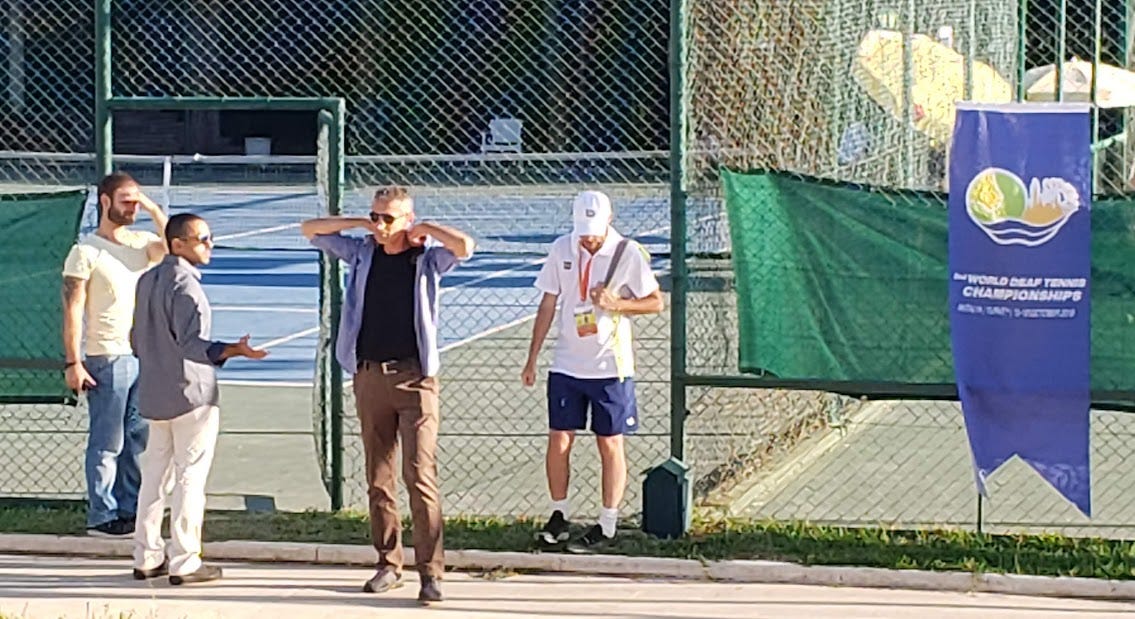Deaf Israeli Tennis Player Turns Into Deaf Israeli IDF Reservist
Deaf and hard-of-hearing individuals should be allowed to serve in the U.S. military?
“Israel’s massive mobilization of 360,000 reservists upends lives,” highlighted the Washington Post on October 10.
Suddenly, I thought of a deaf Israeli tennis player, Gabi Lutsky, who participated in the 2017 Deaflympics in Samsun, Turkey, at the age of 15.
Three weeks ago, Lutsky played in the third World Deaf Tennis Championships in Greece and won the first three matches in the Men’s Singles, but lost the quarterfinal match to the No. 1 seed, Duckhee Lee of South Korea, 0-6, 5-7. [Lee is mentioned in my previous newsletter.]
Back to 2019. When the Israelis entered the second World Deaf Tennis Championships in Antalya, Turkey, my first sight of Gabi Lutsky caused me to be puzzled because he and his father (coach) were surrounded by five bodyguards, consisting of two Israeli bodyguards and three Turkish ones.
During this tennis event, Turkey launched a military operation into northern Syria.
There, I had no chance to chat personally with Lutsky since he is more hard of hearing than a Deaf-cultured individual, but I talked with his deaf team leader. The leader told me that, since Lutsky turned 18, he had to take military training.
Israel is the only country in the world that allows deaf and hard-of-hearing citizens to enlist and serve in the military. However, people with mental or physical disabilities are not mandated to serve, but they may volunteer to serve according to their abilities.
According to the 1986 Israeli Security Service Law, also known as the Israeli Defense Service Law, military service is compulsory for most Israelis when they turn 18. Men have to serve 36 months, and women 24. After this, most of them can be called up to reserve units until age 40, or even older, in case of a national emergency.
The Israel Defense Forces (IDF) have always recruited deaf volunteers and found ways for them to serve in uniform. The IDF communicates with deaf or hard-of-hearing soldiers through adaptive devices, text messages, emails, and lip-reading. The IDF also offers an Israeli sign-language course to help commanders communicate better with these soldiers. These deaf service members are usually exempt from instructing roles or jobs that would require them to communicate by telephone. Better read “The Rita & Burt Tansky - IDF Hearing-Impaired Program.”
Below is an excerpt of the 16-minute video of the Daily Moth’s interview with Shirly Pinto, an Israeli Deaf social-political activist who served as a Member of the Knesset for National Unity for two years. At 18, despite being exempted from compulsory military service, Pinto enlisted in the Israel Defense Forces and served in the Israeli Air Force Technical Corps.
Shirly Pinto: Right now, I want to participate in the army. I’ve already served in the army.
Daily Moth (Alex Abenchuchan): Yes, you did two years.
Shirly Pinto: Right. I can participate in the (reserves). It doesn’t mean I’m a full-time member, but during a time of war, I’m going to support the effort. I’m not going to shoot, but I want to do various tasks, to support the effort.
Daily Moth (Alex): Provide support with organizing things…
Shirly Pinto: Right. I emailed them yesterday and I’m waiting to be called.
Daily Moth (Alex): Are there other deaf people doing this as well?
Shirly Pinto: Yes, if deaf people want to support, they can. Israel doesn’t turn away people. If they want to provide support, they are welcome because we want to win.
Daily Moth (Alex): Wow.
Shirly Pinto: Many deaf people are showing support to the army by donating boxes of food, water, and other things. This place is like our one home. All Israeli people are very supportive of each other and help each other.
Now, I have no idea if Lutsky has completed this training and if he has called up. I noticed he did not attend the Summer Deaflympics in Brazil in May 2022, although the Israeli team sent 18 athletes there. It sounds like he might be in military training during the 2022 Games.
Should deaf and hard-of-hearing individuals be allowed to serve in the U.S. military?
I recalled a story from a Deaf man living in Dayton, Ohio. He said that, during WWII, he was ordered to go to the processing center in Cincinnati. He went through the first floor and got a physical pass. On the second floor, he got a vision pass. But he failed a hearing test on the third floor and received a free train pass for going home. He admitted that he was very disappointed because he wanted to serve.
Anyone wishing to enter the military must pass a hearing test in the USA. According to the Department of Defense (DOD), the existing hearing standard to enlist in the U.S. armed forces is: “A pure tone threshold average of 500, 1000, and 2000 Hz and not more than 30 dB in each ear, with no individual level greater than 35dB at these frequencies.” [Note: To qualify for the Deaflympics, “athletes must have a hearing loss of at least 55db in their ‘better ear.’]
The Selective Service System is authorized by Article I, Section 8 of the United States Constitution, which says Congress "shall have Power To ... provide for calling forth the Militia to execute the Laws of the Union."
Almost all men 18-25 years old in the United States must register for the Selective Service System. As of January 2016, there has been no decision to require females to register with Selective Service or be subject to a future military draft.
In 1963, my dad was furious after learning I got a 1-Y classification. After receiving six battle stars through the horrible Italian campaign in WWII, he asked me to appeal for changing my classification to 4-F.
4-F = Registrant is not acceptable for military service.
1-Y = Registrant qualified for service only during war or national emergency.
Nay, I decided not to appeal it. It's interesting to know both Donald Trump and Joe Biden received 1-Y classifications. (The 1-Y classification was abolished on December 10, 1971.)
There is no Deaf American other than Keith Nolan for fighting for the inclusion of individuals who are deaf and hard of hearing in the U.S. military.
After two years of ROTC at California State University at Northridge, he unfortunately only made it to the third level when the physical hearing test held him back, as mentioned by the Dayton deaf man above.
Watch the 18-minute video on Keith Nolan’s lecture on “Deaf in the Military.”
Nolan learned three things during his research and lobbying:
The Israeli army successfully employs the deaf.
The military still actively deploys soldiers wounded in combat with disabilities. So, what difference does it make if a disability is present before enlistment?
80% of positions in the U.S. military are non-combat. They are active in fields like intelligence, mechanics, or finance.

I encourage you to Google “Keith Nolan” since many articles about his campaign exist.
Three Congressional bills were introduced, two in the House and one in the Senate. These stand-alone bills never made it out of the Senate and House Armed Services Committees.
The last stand-alone bill was H.R. 5831, the Keith Nolan Air Force Deaf Demonstration Act of 2018, which U.S. Rep. Mark Takano of California reintroduced. This bill, initially introduced by former Sen. Tom Harkin of Iowa in 2014, would create a demonstration program in the Air Force for 15 to 20 individuals who would otherwise qualify to serve in the military.
“It is from my direct experience that I can say it is entirely possible for deaf or hard of hearing Americans to serve in the Air Force,” said Casey Doane, a commissioned Officer in the Air Force in 2014. “Obviously, certain accommodations and limitations would have to be made but ultimately no more than for other individuals with unique circumstances who are already serving. Growing up in a deaf family I was able to see first-hand the adversity that deaf individuals faced every day. But more importantly, I was able to see the determination and perseverance that is necessary to serve as a leader in the Air Force. In fact, I credit my own determination to those experiences.”
In the 2016 report, the DOD declared it would be “imprudent” to create a program assessing deaf people’s fitness for military service. It cited the cost of equipment modifications, security risks from wireless assistive devices, and the burden for nondisabled service members if their deaf counterparts can’t perform the full range of military tasks.
Blah, blah, blah, and so on!
Does the DOD know the following?
Theodore "The Rough Rider" Roosevelt had a hearing difficulty that left him completely deaf in one ear.
One of the Two Founding Fathers of the Internet, Vinton Cerf, has worn hearing aids since age 13 and does well with hearing aids with moderate hearing loss.
Thomas Edison was totally deaf in one ear and hard of hearing in the other.
Whoopi Goldberg wears hearing aids in both ears.
Rob Lowe has been deaf in one ear since he was an infant.
In 2014, The Frederick News-Post (of Maryland) had a poll - “Should deaf people be allowed to serve in the armed forces?” The result shows 63.2% on Yes, 25.3% on No, and 11.5% on Not Sure.
Do you know how successful the Women’s Army Corps, the Tuskegee Airmen, and the Navajo Code Talkers were?
Currently, as Co-Chair of the Congressional Deaf Caucus, Rep. Takano exclaimed, “It is time to stop defining deaf Americans by what they can't do, but rather by what they can.”
“President Thomas Jefferson once said that ‘Every citizen should be a soldier,’ and there is no doubt that deaf and hard of hearing Americans can serve and support the number one goal, and that is our national security and missions.” - Keith Nolan.



